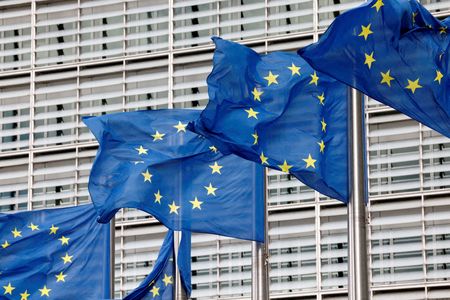By Kate Abnett
BRUSSELS (Reuters) – The European Union will raise an extra 20 billion euros from its carbon market for investments to help end more swiftly the bloc’s reliance on Russian fossil fuels, under a political deal reached on Wednesday.
Negotiators from EU countries and the European Parliament agreed in the early hours of Wednesday to raise 60% of the grants from an EU Innovation Fund – an existing pot of carbon market revenue that is currently spent on breakthrough green technologies.
The other 40% would come from proceeds from CO2 permit sales held earlier than planned.
The EU carbon market forces power plants and factories to buy CO2 permits when they pollute. The price of those permits has surged in recent years, increasing the revenues that countries receive from selling them to CO2-emitting companies.
The funding will go into areas such as expanding renewable energy, energy-saving renovations, and projects to help heavy industry decarbonise.
EU member states and the European Parliament all need to formally approve the deal before it takes effect next year.
EU carbon permit prices have been driven higher partly by tougher emissions-cutting targets that will shrink the supply of CO2 permits available this decade. The benchmark EU carbon permit price traded on Wednesday at around 88 euros per tonne.
The European Commission had originally proposed that the money for new energy investments come from selling permits stored in the carbon market’s “market stability reserve” – a scheme designed to absorb excess permits and stop the market becoming oversupplied.
Countries including the Netherlands and Denmark opposed that idea, warning that toying with the reserve could undermine trust in the carbon market and depress the EU carbon price.
EU negotiators will also attempt to strike a deal later this week on a broader carbon market overhaul, which is central to the EU’s target to cut its net greenhouse gas emissions by 55% from 1990 levels by 2030.
(Reporting by Kate Abnett; Editing by Gareth Jones)

